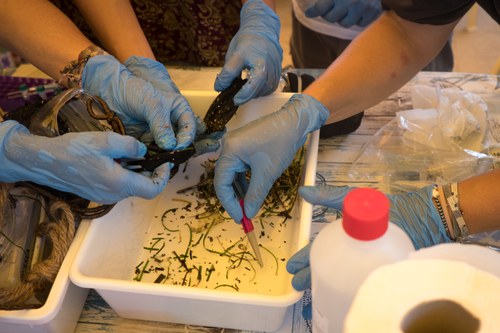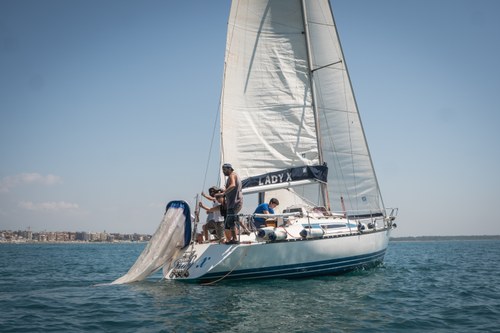Empowering Communities to Combat Marine Pollution: The SeaPaCS Project
SeaPaCS, short for "Participatory Citizen Science against Marine Pollution," is a pioneering project that combines scientific and citizens' efforts to fight against marine plastic pollution.
Published on 14 October 2023 | articles

© Giuseppe Lupinacci
In a coastal town on the shores of the Mediterranean Sea, a transformative initiative is underway. SeaPaCS, short for "Participatory Citizen Science against Marine Pollution," is a pioneering project that combines the efforts of social and natural scientists to harness the power of volunteers in the fight against marine plastic pollution. Led by an enthusiastic team, SeaPaCS is more than just a research endeavor; it's a call to action that is initiating change in the coastal city of Anzio, Italy.
Understanding SeaPaCS
At its heart, SeaPaCS is a citizen science project that brings together a diverse group of individuals, from fishermen to scientists and students. Funded by the European IMPETUS4CS project, the initiative is spearheaded by Chiara Certomà from the University of Turin, with co-coordinators Federico Fornaro and Luisa Galgani, who bring their expertise from the Italian Naval League Anzio and the Marine Biochemistry Division of GEOMAR Helmholtz Centre for Ocean Research Kiel, respectively.
Unveiling the Mission
SeaPaCS is on a mission to raise awareness about the dire consequences of marine plastic pollution on the local biodiversity of Anzio (Rome). It aims to start a transformative process in the city's collective behavior towards a more sustainable future. Two fundamental questions guide this endeavor:
- Unlocking the Mysteries of the Mediterranean Plastisphere: SeaPaCS seeks to explore the living microbial community on plastics and microplastics in marine environments. What microbes inhabit this unique ecosystem, and how are they impacting the biodiversity of the Mediterranean?
- Leveraging Local Wisdom: SeaPaCS recognizes the invaluable experience of sea workers and amateurs. By tapping into their knowledge and insights, the project aims to reduce plastic debris and encourage sustainable practices along the coast.

@ Giuseppe Lupinacci
A Collaborative Approach
SeaPaCS is a true collaboration, involving not only scientists but also various citizen groups, including migrant fishermen cooperatives, students, associations, sailors, divers, video makers, and photographers. These diverse groups come together in "collaboratorium" meetings, training sessions, and collective sea expeditions. Their activities encompass plastic sample collection, microbial life analysis, interviews, and the documentation of new biological formations and fishing plastic practices. The project also includes outreach activities, such as exhibitions, media coverage, and the development of follow-up plans.
Impact Beyond the Horizon
The SeaPaCS project aligns with the goals of the EU Green Deal, particularly in the context of "Protecting our Environment." It supports the United Nations Sustainable Development Goals, focusing on water-related ecosystems (SDG 6) and addressing marine plastic pollution (SDG 14). Furthermore, SeaPaCS is dedicated to combating biodiversity loss, aligning with SDG 15.
A Mediterranean Focus
SeaPaCS's geographical focus is the Mediterranean Sea, a region rich in unique habitats that host 32% of all European-threatened marine ecosystems. Unfortunately, it is also a significant plastic accumulation zone. The project spans the coastal waters within 12 miles from the shores of Anzio, a small village located just 60 kilometers south of Rome. With a local economy heavily dependent on the sea, including fishing, commercial boating, and tourism, SeaPaCS holds the promise of transforming this coastal town into a beacon of sustainability and environmental stewardship.
In summary, the SeaPaCS project is a remarkable collaboration that aims to empower communities to combat marine pollution, emphasizing the importance of citizen participation and interdisciplinary cooperation. By uniting diverse stakeholders and focusing on a vulnerable yet crucial ecosystem, it's a shining example of how science and society can join forces to protect our planet's most precious resources.
You can read more about SeaPaCS and the project's activities in this factsheet.
Learn more about SeaPaCS by joining our webinar “Riding the Waves of Resilience: Empowering Coastal Communities” on October 19th, 2023!
Cover picture: © Giuseppe Lupinacci (g.lupinacciphoto@gmail.com)